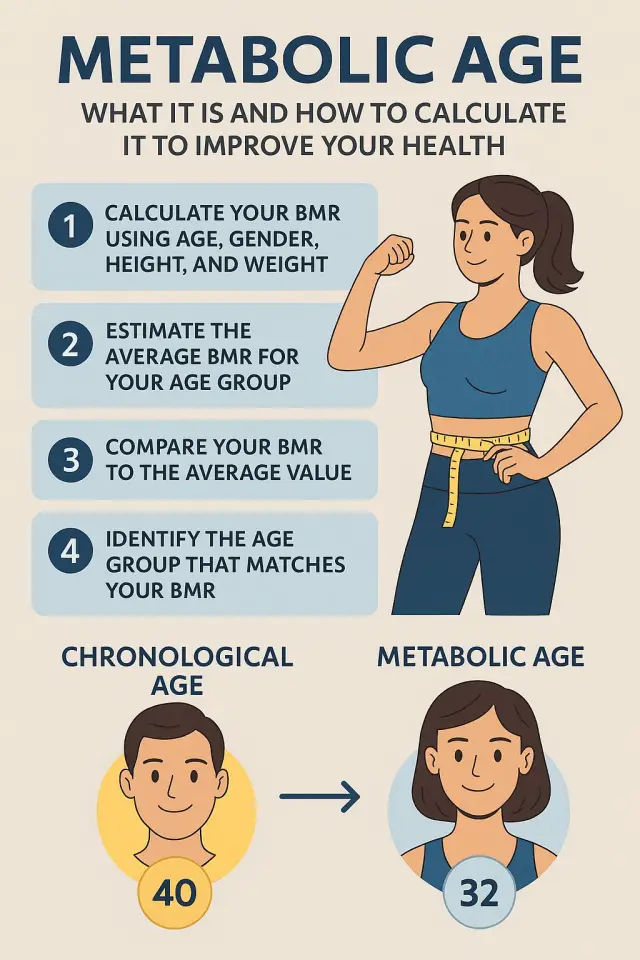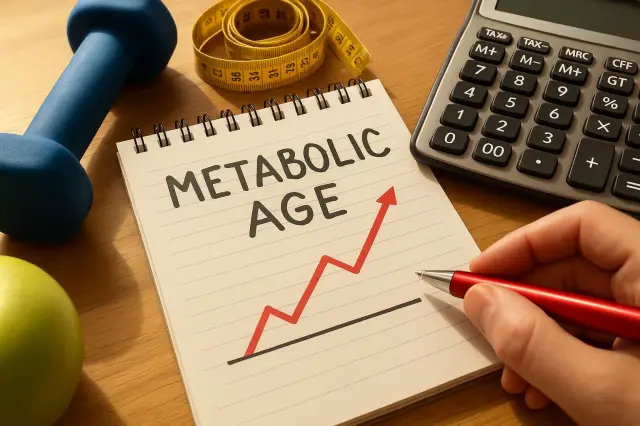When it comes to understanding your body and optimizing your health, there are more useful indicators than just weight or chronological age. One such powerful metric is your metabolic age. Unlike the number of candles on your birthday cake, your metabolic age reflects how efficiently your body burns energy compared to the average person of your actual age.
In this article, we’ll break down what metabolic age really means, how it’s calculated, why it matters, and what you can do to improve it using lifestyle changes and helpful tools like health calculators.
What Is Metabolic Age?
Your metabolic age is a number that compares your Basal Metabolic Rate (BMR) to the average BMR of people in your chronological age group. In simpler terms, it tells you whether your body is functioning “younger” or “older” than your actual age, based on how many calories it burns at rest.
If your metabolic age is lower than your real age, your body is more efficient than average—great news! But if your metabolic age is higher, it could be a sign that your metabolism is slower than it should be, which may increase the risk of weight gain, fatigue, and chronic conditions.
How Is Metabolic Age Calculated?
To calculate metabolic age, you need to first determine your Basal Metabolic Rate (BMR). This is the number of calories your body needs to perform basic functions at rest—like breathing, digesting, and maintaining body temperature.

BMR is calculated using several factors:
- Age
- Gender
- Height
- Weight
- Body fat percentage (if available)
Once your BMR is known, it is compared to the average BMRs of people in different age groups. If your BMR is similar to the average BMR of a 25-year-old, for example, your metabolic age is 25—even if you’re 40.
You can instantly estimate your BMR and metabolic age using a health calculator designed for this purpose. It removes all the guesswork and gives you personalized results.
Why Is Metabolic Age Important?
Metabolic age provides a more detailed view of your health than just weight or BMI. It gives you insights into:
- Your current metabolic efficiency
- How lifestyle, diet, and exercise impact your internal health
- Risks of metabolic syndrome, obesity, and low energy
Understanding and improving your metabolic age can help you:
- Feel more energetic
- Lose or maintain weight more effectively
- Boost longevity and overall well-being
What’s a Healthy Metabolic Age?
In general, a healthy metabolic age is equal to or younger than your chronological age. For example:
- A 35-year-old with a metabolic age of 28 is in good shape.
- A 45-year-old with a metabolic age of 50 might benefit from lifestyle changes.
There’s no universal "perfect" metabolic age, but the younger it is compared to your real age, the more efficiently your body is working.
How to Calculate Your Metabolic Age
Here’s a quick step-by-step guide to estimating your metabolic age using tools and basic information:
- Calculate your BMR using a BMR calculator or body composition analyzer.
- Compare your BMR to standard averages for your age and gender.
- Determine which age group has the closest BMR to yours—that’s your metabolic age.
If you want an instant answer, try our comprehensive Health Calculators section to explore a range of tools, including metabolic age and BMR estimators.
Factors That Influence Your Metabolic Age
Several lifestyle and biological factors impact your metabolic age, including:
- Muscle mass: More muscle increases BMR and reduces metabolic age
- Activity level: Sedentary lifestyles slow your metabolism
- Diet: Poor nutrition can impair metabolic functions
- Sleep and stress: Both can negatively affect hormone balance and metabolism
Tips to Improve Your Metabolic Age
If your metabolic age is higher than your real age, don’t panic. Here are science-backed strategies to reverse it:
1. Build Muscle
Strength training 2–3 times per week helps increase lean muscle mass, which burns more calories even at rest.
2. Stay Active Daily
Incorporate movement throughout your day—walk, cycle, stretch, or take short activity breaks. Use a time blocking planner to schedule fitness into your calendar.
3. Eat Smart
Focus on whole foods, fiber-rich veggies, protein, and healthy fats. Limit sugars and processed carbs. Consider calculating your daily caloric needs to maintain energy balance.
4. Get Better Sleep
Adults need 7–9 hours of quality sleep to support hormone regulation and metabolic processes. Prioritize a regular sleep schedule and sleep hygiene.
5. Reduce Stress
Chronic stress increases cortisol, which slows metabolism and promotes fat storage. Try mindfulness, breathing techniques, or journaling.
6. Stay Hydrated
Drinking enough water supports digestion, energy, and cellular metabolism. Aim for 2–3 liters per day depending on your activity level.
Metabolic Age vs. Chronological Age
Metabolic age is not your “real age” but a health metric that reflects your body's physiological efficiency. Think of it as your body's biological age based on function rather than time.
Some people in their 40s can have the metabolic age of someone in their 20s—thanks to regular exercise, nutrition, and healthy habits. On the other hand, sedentary habits and poor diet may give a 30-year-old a metabolic age of 45.
Why You Should Monitor Metabolic Age Regularly
Monitoring your metabolic age over time gives you a clear picture of whether your health is improving or declining. It’s more dynamic than weight alone and more meaningful than BMI.
You can check in monthly using a health calculator, smart scale, or with your fitness coach or physician. As you adjust your lifestyle, you should begin to see improvements.
Use Technology to Track Progress
At Calculatorr, we offer a suite of tools that support your health journey. Start by visiting the Health Calculators hub to explore more ways to measure your fitness and well-being. You can also log progress manually with a Habit Tracker and plan wellness goals using a To-Do List customized for your health routine.
Final Thoughts: Let Metabolic Age Guide Your Fitness, Not Define It
Metabolic age is a valuable insight into your health—but it’s not a life sentence. Instead, think of it as a guide to help you make smarter choices about your body and lifestyle. Whether you're already healthy or just getting started, tracking and improving your metabolic age can help you feel better, look better, and live longer.
Ready to take the first step? Start by calculating your metabolic age today—and build a healthier tomorrow.




